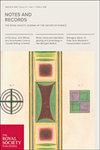Selling visions: Kantianism, cameralism and applied science realized through encyclopaediae in Germany and beyond
IF 0.6
3区 哲学
Q3 HISTORY & PHILOSOPHY OF SCIENCE
Notes and Records-The Royal Society Journal of the History of Science
Pub Date : 2018-09-20
DOI:10.1098/rsnr.2018.0007
引用次数: 1
Abstract
This paper explores the introduction of the term ‘applied sciences’ into English from German at the beginning of the nineteenth century. First used for, and in, The Encyclopaedia Metropolitana, a project of Samuel Taylor Coleridge, the term served to describe the space between pure knowledge and practice, for a community to whom change in commerce and agriculture required elite management as well as encouragement. Addressed to those of ‘clerkly acquirements’, the audience anticipated Coleridge's later term of ‘clerisy’. I argue that we see a rather late example, on the periphery of the German cultural world in academically underserved Britain, of the importance of the encyclopaedia as a means of structuring knowledge. Mediating between an international cameralist tradition, a Kantian philosophical framework and a newly wealthy and aspirational audience, The Encyclopaedia Metropolitana was a cultural weapon through both its contents and its structure. It provided meaning to applied sciences as an epistemic category less certain than, and dependent on, the pure sciences, but also inclusive of a range of important subjects from chemistry to fortification. I argue that the term had served this role already in German, particularly after its adoption by Kantians, and moreover in encyclopaediae. In The Encyclopaedia Metropolitana, too, the categories of pure and applied science enabled the editor and readers to manage the burgeoning knowledge and destabilizing change of the early nineteenth century.销售愿景:通过德国及其他地区的百科全书实现的康德主义、摄影主义和应用科学
本文探讨了19世纪初“应用科学”一词从德语传入英语的过程。这个词最初用于塞缪尔·泰勒·柯勒律治(Samuel Taylor Coleridge)的《大都会百科全书》(The Encyclopaedia Metropolitana)中,用来描述纯粹知识和实践之间的空间,指的是商业和农业变革需要精英管理和鼓励的群体。针对那些“文员式的获得”,观众期待着柯勒律治后来的术语“知识”。我认为,我们看到了一个相当晚的例子,在德国文化世界的边缘,在学术落后的英国,百科全书作为构建知识的一种手段的重要性。《大都会百科全书》在国际摄影传统、康德哲学框架和新贵和有抱负的读者之间进行了调解,从其内容和结构来看,它都是一种文化武器。它为应用科学提供了意义,作为一种认知范畴,它不像纯科学那样确定,而且依赖于纯科学,但也包括从化学到防御工事的一系列重要学科。我认为,这个词在德语中已经扮演了这个角色,尤其是在被康德学派采用之后,而且在百科全书中也是如此。在《大都会百科全书》中,纯科学和应用科学的分类也使编辑和读者能够应对19世纪初迅速增长的知识和不稳定的变化。
本文章由计算机程序翻译,如有差异,请以英文原文为准。
求助全文
约1分钟内获得全文
求助全文
来源期刊
CiteScore
1.50
自引率
0.00%
发文量
45
审稿时长
>12 weeks
期刊介绍:
Notes and Records is an international journal which publishes original research in the history of science, technology and medicine.
In addition to publishing peer-reviewed research articles in all areas of the history of science, technology and medicine, Notes and Records welcomes other forms of contribution including: research notes elucidating recent archival discoveries (in the collections of the Royal Society and elsewhere); news of research projects and online and other resources of interest to historians; essay reviews, on material relating primarily to the history of the Royal Society; and recollections or autobiographical accounts written by Fellows and others recording important moments in science from the recent past.

 求助内容:
求助内容: 应助结果提醒方式:
应助结果提醒方式:


